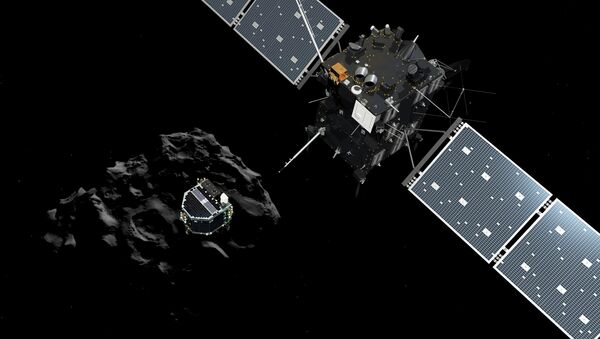The 12-year mission is the first time a man-made object has examined a speeding comet up-close.
Operations complete. Flight team sad. We'll go on to other missions, but none will be like @ESA_Rosetta #CometLanding #67P #MissionComplete https://t.co/MFsVTBTii8
— ESA Operations (@esaoperations) 30 сентября 2016 г.
In 2014, the Rosetta spacecraft deployed its Philae lander on the comet 67P/Churyumov-Gerasimenko where it collected samples of the comet’s dust, gas and plasma environment as well as taking detailed photos of its surface.
Loss of signal #LOS Contact with @ESA_Rosetta fades to zero 13:19 CEST #CometLanding #EndOfMission #67P pic.twitter.com/0beY5B3WRX
— ESA Operations (@esaoperations) 30 сентября 2016 г.
Scientists in the European Space Agency control center in Darmstadt, Germany, are sifting through the data received in the hope of discovering hints of the origins of the solar system as it is believed that the comet’s formation dates back to this early time.
Incredible view 1.2 km from the surface! #CometLanding https://t.co/BMzkfFMKp4 pic.twitter.com/N5riAfHxEV
— ESA Rosetta Mission (@ESA_Rosetta) 30 сентября 2016 г.
The results delivered by Rosetta have brought scientists closer to understanding the early formation of our Solar System.
Rosetta’s data collection showed the presence of glycine molecules, the simplest amino acid, and other molecular material.
From #67P with love: a last image, taken 51 metres before #CometLanding #MissionComplete https://t.co/yiSnxDrnba pic.twitter.com/MNuz622tNJ
— ESA Rosetta Mission (@ESA_Rosetta) 30 сентября 2016 г.
One of the most important findings made by the spacecraft was the discovery of phosphorus in the comet. This chemical element is a key component of DNA, which makes it an essential ingredient in the creation of life.
Thanks to the data collected during the ESA Rosetta Mission, scientists can now conclude that the primal matter of the Solar System had all components necessary for life.
LIVE NOW: Join us for @ESA_Rosetta end of mission #CometLanding https://t.co/2yc9I6Pvsb pic.twitter.com/kcfyfkK9uY
— ESA (@esa) 30 сентября 2016 г.
Overall, the data makes it clear that the primal matter of the Solar System had all components necessary for life.
Additionally, experts now believe that asteroids rather than comets were the ones to deliver water to Earth, theoretically enabling life on our planet.
Head of the Rosetta mission, Matt Taylor, believes that scientists will analyze data, collected by Rosetta and Philae, over the following years and maybe even decades.
“Inevitably, we now have new mysteries to solve. The comet hasn’t given up all of its secrets yet, and there are sure to be many surprises hidden in this incredible archive. So don’t go anywhere yet – we’re only just beginning,” reads the ESA official website.




